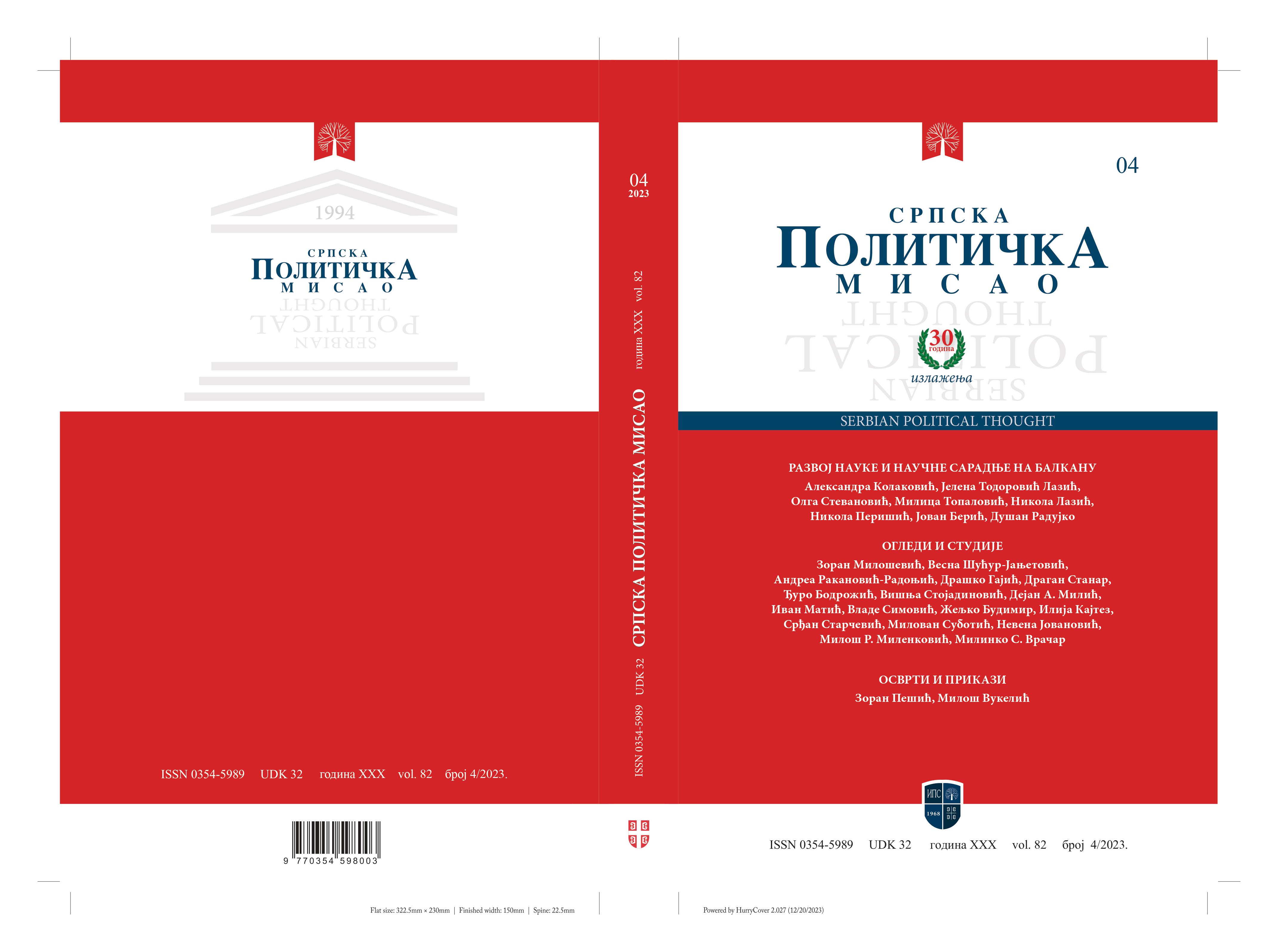The Ukrainian crisis and the question of sovereignty and territorial integrity
Abstract
The current armed conflict between Russia and Ukraine is a consequence of their decade’s long complex and complicated relations, which was influenced by the United States and the countries of Western Europe. The organization of the referendum and signing of the decree on the annexation of Crimea and Sevastopol to the Russian Federation, and the conflicts in the Donbass that lasted until 2018 significantly damaged the political relations of these two countries, which were part of the Soviet Union until 1991, when they acquired their independence. The escalation of continuously bad relations led to an armed conflict, but also to the most significant political, economic and military crisis, and the consequences which were felt by the entire world.
The topic of this research is the Ukrainian crisis with reference to the sovereignty and territorial integrity of Ukraine after the referendums and the joining of four regions (Donetsk, Lugansk, Zaporozhye and Kherson) to the Russian Federation. The article aims to indicate and emphasize that the key international actors who (in)directly participate in the conflict between Russia and Ukraine have different approaches when it comes to the sovereignty and territorial integrity of Ukraine, that is, when it comes to the sovereignty and territorial integrity of the Republic of Serbia, forgetting on respecting the principle of sovereign equality of states. In other words, since the outbreak of the armed conflict in Ukraine in February 2022, we have witnessed that member states of the international community, guided by their own national interests, can take different positions regarding the sovereignty and territorial integrity of a particular state, as a result of differently formulated policies.
References
Гајић Александар, Никола Рајић. „Геополитички оквир руске војне интервенције у Украјини,“ Политика националне безбедности, бр. 1/2022, 127-146.
Димитријевић Душко, Ивона Лађевац, Михајло Вучић. Предузете активности у УН око решавања питања Косова и Метохије, Међународни проблеми, бр. 4, 2012, 442–478.
Димитријевић Душко. Сецесија држава у доктрини и пракси међународног права, у зборнику радова Сецесија са становишта унутрашњег и међународног права и њене политичке последице (ур. Кнежевић, Зоран, Чавошки, Коста,| Костић, Владимир), 2020, 53-82.
Марковић Ратко. Уставно право, Службени гласник Београд, 2016.
Милутиновић Милован, Зоран Калинић, Слободан Радуљ. „Сецесија израз права народа на самоопредељење“, Сварог, 9/ 2014, 20-48.
Настић Маја. „Непосредно учешће грађана у поступку промене устава“, у Ревизиона власт у Србији – процедурални аспекти уставних промена (ур. Шарчевић Един, Симовић Дарко), Фондација Центар за јавно право, Сарајево, 2017.
Николић Оливер. „Референдум (са посебним освртом на Швајцарску и Хрватску)“, Страни правни живот, бр. 1/2013, 13-26.
Петровић Драган, „Украјинска криза 2013-2015“, Култура полиса, год. XII, 2015, бр. 26, 219-236.
Петровић Драган, Рајко Буквић. Украјинска криза 2013-2019., Београд, Институт за међународну политику и привреду, 2019.
Станар Драган, "Стратешка одгворност оружаних снага при доношењу политичке одлуке о војној неутралности", Војно дело, Vol. 74, 4/2022, 40-51.
Станар Драган, Етика међународне политике, Добротољубље, Београд, 2021.
Станојевић Иван. „Безбедносна дилема у Украјини - друго читање Берија Посена“, Politeia, vol. 4, no. 8, 2014, 57-67.
Томић Т. Милош. Угрожавање националне безбедности сецесијом територија са расположивим природним ресурсима: случај Србије, Украјине и Шпаније, докторска дисертација, Универзитет у Београду, Факултет Безбедности, 2022.
Foreign Ministry’s statement on the referendums in the DPR, LPR, Kherson and Zaporozhye regions 2023, https://mid.ru/en/foreign_policy/news/1831658/, last accessed 28 September 2023.
Hurst Hanum, The Advisory Opinion on Kosovo: An Opportunity Lost, or a Poisoned Chalice Refused?, Leiden Journal of International Law, No. 24, 2011, 155 – 161.
Kuzio Taras, Paul D'Anier. The Sources of Russia's Great Power Politics: Ukraine and the Challenge to the European Order, England, 2018.
Mills, Claire, Patrick Butchard. Implications of the Russian-backed referendums in Ukraine, House of Commons Library, Research Briefing, Nо. 9631, 2022.
Miloglav Hrvoje, Pasko Tomaš. Protivpravnost intervencije i aneksije u međunarodnom pravu: slučaj Krima. Paragraf, 2017, 159-190.
Stanar, Dragan. "Paramilitary Organizations and Private Military Companies in War: How to Restrain What You Do Not Control", in Patrick Mileham (ed.), Jus Post Bellum: Restraint, Stabilization and Peace, Brill Nijhoff, Leiden/Boston, 2020, 362-387.
The Kremlin. 2022. “Signing of documents recognising Donetsk and Lugansk People’s Republics.“ 15 August 2023. http://en.kremlin.ru/events/president/news/copy/67829
United Nations General Assembly [UNGA], RES/ES-11/4 (2022), Resolution ES-11/4 (2022) Adopted by the General Assembly at its 11th emergency special sess, on 12 October 2022.
Декларация о независимости Автономной Республики Крым и г.Севастополя 2014, 11. March 2014, https://web.archive.org/web/20140313100800/http://www.rada.crimea.ua/news/11_03_2014_1, last accessed 15 August 2023.
Сергей Смирнов. 2014. „Донецкая народная республика провозгласила себя суверенным государством.“ Ведомости, 12. мая https://www.vedomosti.ru/politics/articles/2014/05/12/dnr-provozglasila-sebya-suverennym-gosudarstvom, last accessed 15 August 2023.
Указ Президента Российской Федерации о признанин Херсонской области, 29. сентября 2022.
Указ Президента Российской Федерации о признанин Запорожской области, 29. сентября 2022.

